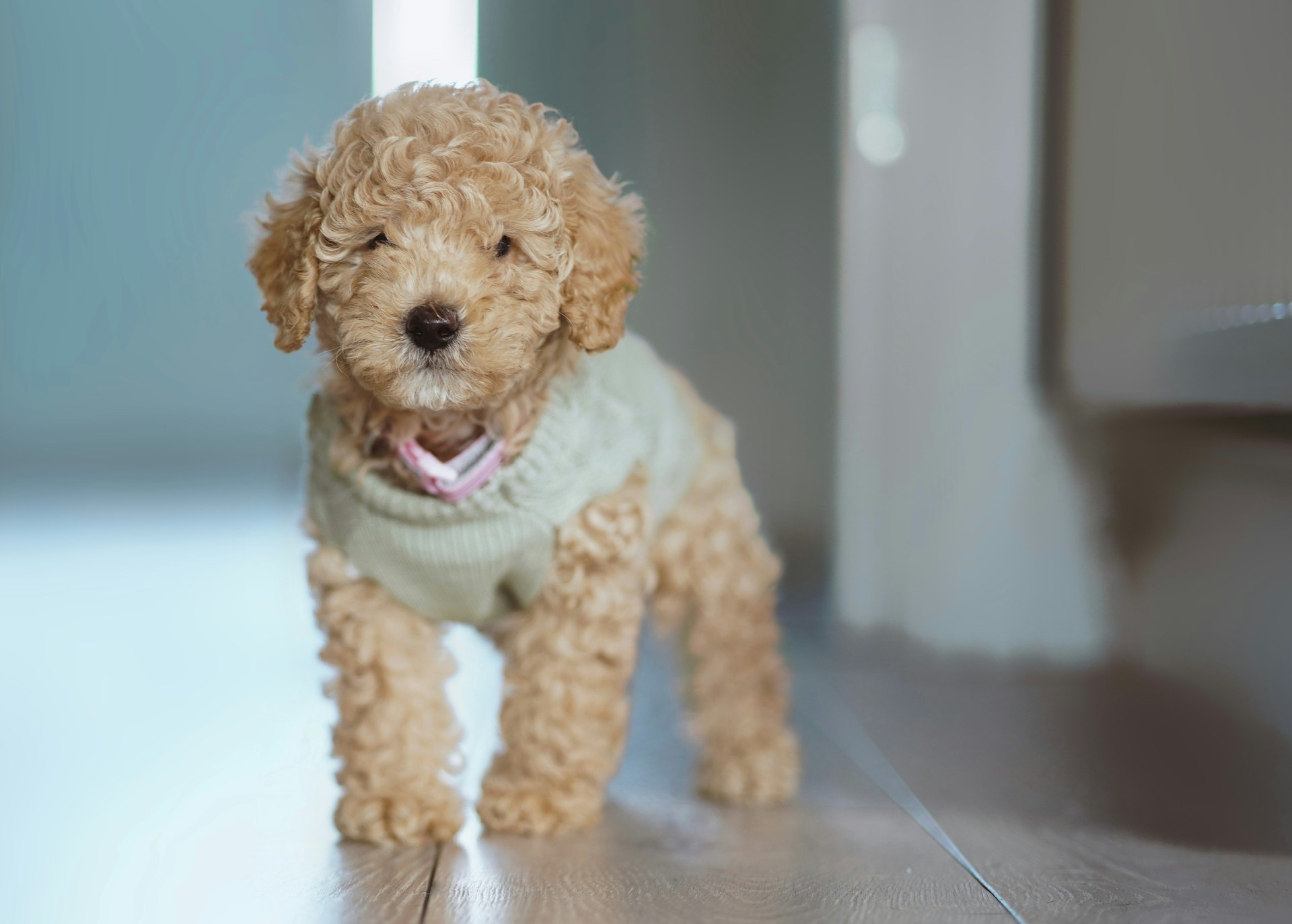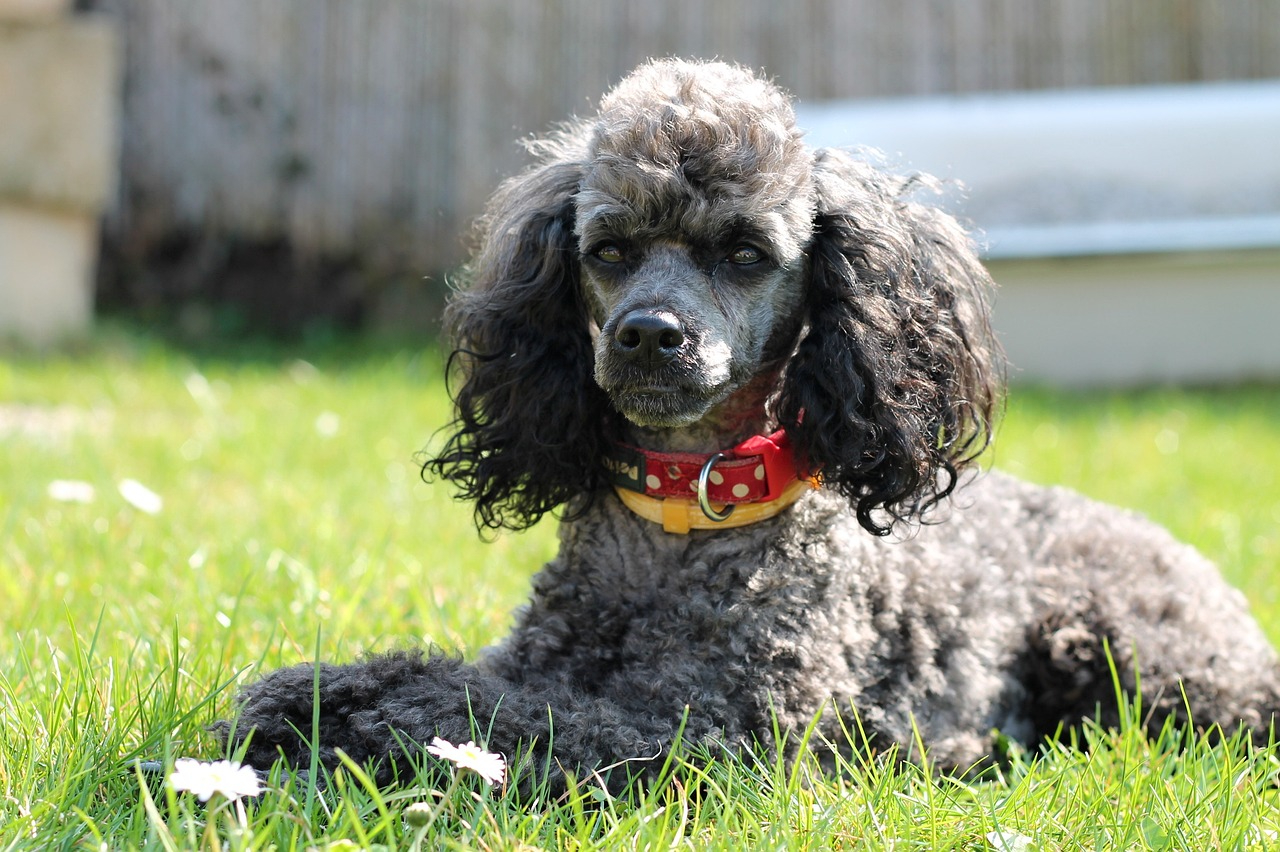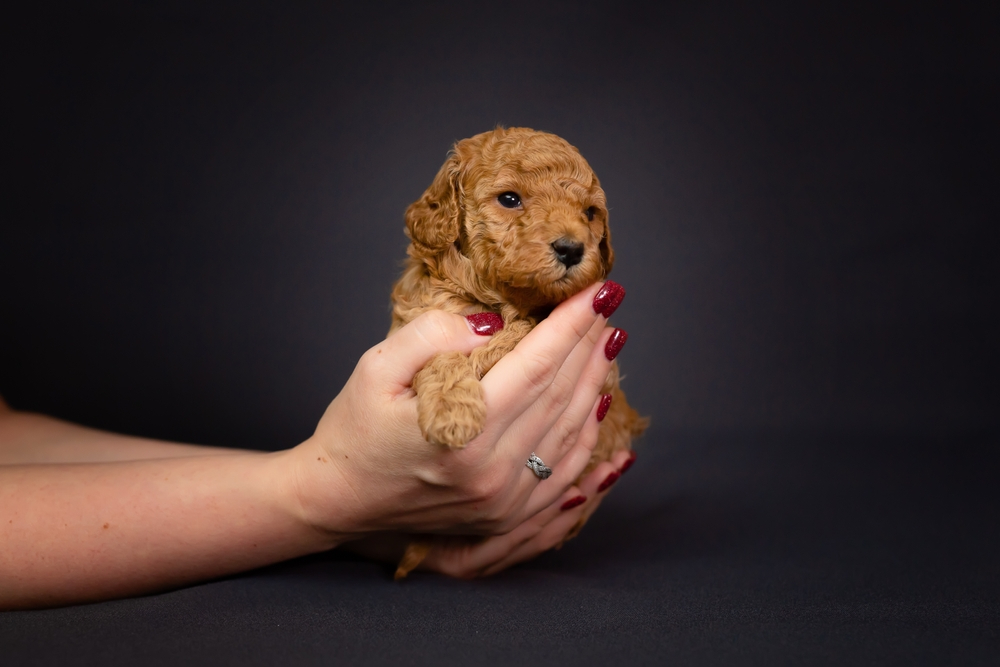Original Article: https://www.dogster.com/dog-health-care/how-big-do-mini-poodles-get-size-weight-growth-chart
Click to Skip Ahead
When you buy a Miniature Poodle, you might not know just what to expect. How big are they going to get exactly and how big is “miniature” anyway? When you first bring them home, they will likely fit snugly into both of your hands. But soon they will start to grow, develop, and change before your eyes until they reach their adult size. Miniature Poodles can range anywhere from 10 to 15 pounds as fully grown adults.
In this article, we’re going to talk about certain things that influence Miniature Poodle growth, and even give you a size chart breakdown of what you can expect.


Miniature Poodle Overview
The Miniature Poodle is one of three different size variations of the Poodle breed. It lies directly in the middle between the toy and standard. Like all the other Poodles, this variation is incredibly intelligent, often named one of the top three smartest dog breeds.
When your puppy starts to develop into their adult self, you will want to make sure that their growth is on par for their age. Once they are fully grown, it is necessary to maintain an appropriate weight and suitable diet for their whole lives.

Miniature Poodle Size and Growth Chart
Keep in mind that this chart is applicable to Miniature Poodles and does not apply to Toy or Standard Poodle variations. It also isn’t applicable to hybrid Doodle breeds. Due to biological variation, a small percentage of dogs will fall outside the normal growth curve. Finally, it’s important to look at your dog’s body condition score when determining if they are an appropriate weight relative to their frame.
| Age | Weight Range (in pounds) |
| 2 months | 2–5 |
| 4 months | 5–9 |
| 8 months | 8–14 |
| 10 months | 9–15 |
| 12 months | 10–15 |
When Does a Miniature Poodle Stop Growing?
Miniature Poodles generally stop growing physically at approximately 10-12 months of age. They slow down significantly after the 6-month mark, but don’t fully fill out until they are around a year old.
When it comes to maturity, these dogs tend to get a little calmer around 18 months to 2 years of age.


Factors Affecting the Size of a Miniature Poodle
There are many different factors that influence a Poodle’s growth. It might seem like it’s all the same, but genetics, environment, diet, and overall health contribute to the ultimate size of your miniature poodle.

Sex
Like many other canine breeds, females are typically smaller than males. Males get a little stockier than their female counterparts, though neither bulk up very much. If they are mixed with any other dog breed, size isn’t really defined by sex alone. Also, there can be runts in the litter which may never be quite as big as their siblings despite sex.
Genetics
If your miniature Poodle’s parents are on the small side, your pup may be this way to. Whereas if they are larger your pup may grow to be bigger than average. Size is partially genetic so looking at your dog’s parent’s size will give you a rough idea of their potential.
Diet
It is crucial to choose a specific diet for your Miniature Poodle. There are so many options on the market, and we keep learning more and more about pet nutrition. As a puppy, they will need a diet designed for growth. There are always dry kibble and wet canned food options. People select these different recipes based on their own research and veterinary recommendations.
However, more and more families are switching to fresh foods for their dogs. The diets ensure quality ingredients with minimal processing, but they are more expensive. If you want to home cook your pup’s food you will need a recipe from a Board-Certified Veterinary Nutritionist. Be wary of any other qualifications or online recipes as these are likely to have nutritional imbalances. Puppies are especially prone to becoming sick from inappropriate diets.
Many standard dog foods are full of preservatives, additives, and artificial ingredients that aren’t as good for their systems and don’t provide quality ingredients. These diets aim to eliminate those particular risk factors.
Feeding an appropriate diet in the correct portions is the best way to help your Miniature Poodle maintain a healthy weight. Overfeeding can lead to weight gain and obesity, which can lead to further health problems down the line. Underfeeding can lead to malnutrition and result in your dog not gaining the appropriate amount of weight. Speak to your vet about the appropriate portions to feed your dog.

If you need to speak with a vet but can’t get to one, head over to PangoVet. It’s an online service where you can talk to a vet online and get the personalized advice you need for your pet — all at an affordable price!
Health
Parasites, illnesses, and even some genetic problems can slow growth rates. When purchasing your Poodle, it is important that the breeder takes good care of the pups and does all genetic testing so that puppies are happy and healthy. It’s definitely for the best to ensure your particular dog is going to have sound health and stick around for years to come so you don’t end up with costly vet bills and an unhealthy dog.
Activity Level
The more active your dog is, the more likely that they will be healthier in general and won’t gain excess weight. If you have a Miniature Poodle who loves to be on the go and gets an appropriate amount of exercise, they will be more likely to stay at a healthy weight.


Ideal Diet for Maintaining a Healthy Weight
A couple of key elements go into maintaining a healthy weight for your Miniature Poodle. The appropriate diet is the primary aspect of weight control. Every single type of dog food you can get on the market comes with serving instructions so your pup gets approximately the correct amount of calories, but keep this is just a guide as each dog has a different metabolism.
If you buy dry kibble or wet canned food, the instructions are on the label. If you opt for fresh food on a subscription-based service, they come prepackaged as individual servings, to take out the guessing work for you.
Your dog may have certain factors in which they need more or less food, so always speak to your vet about the best amounts to feed your dog.
How to Measure Your Miniature Poodle
Keeping measurements of your Miniature Poodle can help you for a variety of reasons. As they’re growing, you will want to ensure you’re buying harnesses and collars that are suitable to fit your animal.
It’s also a good way to keep track of their growth so you can make sure they are staying on par. But how exactly do you measure a dog? It’s very easy. The only thing you will need is a flexible tape measure and a pencil and piece of paper to jot down the results.

- Length: Measure between the shoulder blades to the base of the tail.
- Neck: Measure around the circumference of the neck where the collar normally lies.
- Waist: Measure the narrowest part of the body toward the back of the legs.
To measure your dog’s weight, all you have to do is have them sit on a scale. If your dog is small, you can use a baby scale. For bigger dogs you can stand on a scale by yourself, then stand on a scale holding them. Subtract your weight from the combined weight to find the weight of your dog.


Conclusion
So now you understand a little bit more about Miniature Poodles and their overall growth. Several different factors can influence a Poodle’s growth, but most will remain within the 10- to 15-pound range.
If the Miniature Poodle is mixed with any other type of dog, size can vary quite drastically. Also, this article is, again, not applicable to Toy or Standard Poodles.
Featured Image Credit: Sue Thatcher, Shutterstock
Source: Dogster












